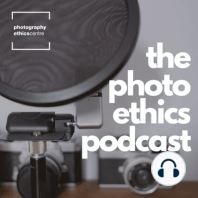40 min listen

Taha Ahmad: On working with historical trauma
Taha Ahmad: On working with historical trauma
ratings:
Length:
31 minutes
Released:
Nov 11, 2020
Format:
Podcast episode
Description
In this episode, we talk with Taha Ahmad about how he navigates ethics in his longterm projects. He stresses the importance of extensive research in his workflow, of building relationships with the people he photographs, and of approaching traumatic histories with care and sensitivity. Finally, he describes the personal experiences that have tested his ethics.What you’ll find inside:“I would not have been able to access [family archives] because it is with the family, so I have to take the permission. And whenever I shoot any of the archival material, I shoot it in front of the family members so that they are aware what I am shooting or what I am scanning or which letter I’m scanning and also how I’m going to use it.” (7:28)“It’s not easy and you know it’s not even easy emotionally for me because you know talking about those incidents again and again … a lot of times talking about this takes them back and gives them an emotional toll. What I do is, my process is I never go and talk about it straight away. … They start telling me themselves, and this is how I finally make a relation with them. And then I start asking them questions so that they don’t feel that I am here just to extract the tragic memories they have, but instead you know they feel that I am a curious person who is here to understand.” (10:10)“I know that I work on longterm projects, I have ample time. So, even if I am not shooting for, let’s say, two weeks, it doesn’t matter to me. What matters to me is that I’m able to get the real truth out of it.” (13:14)Discussion about the importance of research (15:00)“Research is also something which actually becomes a part of your process, it is something which actually leads you to a particular idea, it is something which decides how you are going to execute it, how are you going to gain access. … This is why research is important, because when a person knows about the roots of their work … they have a better understanding of the kind of work they are going to produce and what impact the work could make when it is out in front of the world.” (16:40)On making decisions about photographing graphic subjects (Warning: Graphic content 22:00 – 24:00) (21:05)Complications of consent when embedding in a community (26:30)What does photo ethics mean to Taha?“Photography ethics I would say, especially for me, it might differ from person to person … for me it is kind of the morals that I live my daily life with … ethics again differ from place to place, work to work, and situation to situation.” (18:30)Links:The Other Side of Silence: Voices from the Partition of India by Urvashi Butalia
Released:
Nov 11, 2020
Format:
Podcast episode
Titles in the series (49)
Martha Tadesse: On unlearning and learning ethics: A discussion of ethics and representation in humanitarian photography by The Photo Ethics Podcast